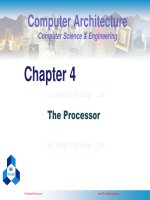kiến trúc máy tính võ tần phương assignmentignmentignmentignmentignment 2 solution sinhvienzone com
Bạn đang xem bản rút gọn của tài liệu. Xem và tải ngay bản đầy đủ của tài liệu tại đây (22.87 KB, 4 trang )
ICS 233 – Computer Architecture &
Assembly Language
Assignment 2 Solution: MIPS Instructions and Assembly Language
1. (2 pts) Bits have no inherent meaning. Given the 32-bit pattern:
1010 1101 0001 0000 0000 0000 0000 0010
What does it represent, assuming it is …
a) A 2's complement signed integer?
b) A MIPS instruction?
Solution:
a) -1,391,460,350
b) Op = 1010112 = 0x2b = sw - store word (I-Type format)
rs = 010002 = r8
= $t0
rt = 100002 = r16 = $s0
immediate16 = 0000 0000 0000 00102 = 2
MIPS instruction = sw $s0, 2($t0)
2. (2 pts) Find the shortest sequence of MIPS instructions to:
a) Determine if there is a carry out from the addition of two registers $t3 and $t4. Place
the carry out (0 or 1) in register $t2. It can be done in two instructions.
b) Determine the absolute value of a signed integer. Show the implementation of the
following pseudo-instruction using three real instructions:
abs
$t1, $t2
Solution:
a) addu $t5, $t3, $t4
sltu $t2, $t5, $t3
# there is carry if sum < any operand
b) addu $t1, $t2, $zero
bgez $t2, next
subu $t1, $zero, $t2
next:
Prepared by Dr. Muhamed Mudawar
CuuDuongThanCong.com
Page 1 of 4
/>
3. (4 pts) For each pseudo-instruction in the following table, produce a minimal sequence of
actual MIPS instructions to accomplish the same thing. You may use the $at for some of
the sequences. In the following table, imm32 refers to a 32-bit constant.
Pseudo-instruction
move $t1, $t2
addu
Solution
$t1, $t2, $zero
clear $t5
addu
$t5, $zero, $zero
li
$t5, imm32
lui
ori
$t5, upper16
$t5, $t5, lower16
addi
$t5, $t3, imm32
lui
ori
add
$at, upper16
$at, $at, lower16
$t5, $t3, $at
beq
$t5, imm32, Label
lui
ori
beq
$at, upper16
$at, $at, lower16
$t5, $at, Label
ble
$t5, $t3, Label
slt
beq
$at, $t3, $t5
$at, $zero, Label
bgt
$t5, $t3, Label
slt
bne
$at, $t3, $t5
$at, $zero, Label
bge
$t5, $t3, Label
slt
beq
$at, $t5, $t3
$at, $zero, Label
4. (2 pts) Translate the following statements into MIPS assembly language. Assume that a,
b, c, and d are allocated in $s0, $s1, $s2, and $s3. All values are signed 32-bit integers.
a) if ((a > b) || (b > c)) {d = 1;}
Solution:
bgt
ble
L1:
ori
next:
$s0, $s1, L1
$s1, $s2, next
$s3, $zero, 1
b) if ((a <= b) && (b > c)) {d = 1;}
Solution:
bgt
ble
ori
next:
$s0, $s1, next
$s1, $s2, next
$s3, $zero, 1
Prepared by Dr. Muhamed Mudawar
CuuDuongThanCong.com
Page 2 of 4
/>
5. (3 pts) Consider the following fragment of C code:
for (i=0; i<=100; i=i+1) { a[i] = b[i] + c; }
Assume that a and b are arrays of words and the base address of a is in $a0 and the base
address of b is in $a1. Register $t0 is associated with variable i and register $s0 with
c. Write the code in MIPS.
Solution:
loop:
addu
addu
addu
addiu
lw
addu
sw
addiu
addiu
addiu
bne
$t0,
$t1,
$t2,
$t3,
$t4,
$t5,
$t5,
$t0,
$t1,
$t2,
$t0,
$zero, $zero
$a0, $zero
$a1, $zero
$zero, 101
0($t2)
$t4, $s0
0($t1)
$t0, 1
$t1, 4
$t2, 4
$t3, loop
#
#
#
#
#
#
#
#
#
#
#
i = 0
$t1 = address a[i]
$t2 = address b[i]
$t3 = 101 (max i)
$t4 = b[i]
$t5 = b[i] + c
a[i] = b[i] + c
i++
address of next a[i]
address of next b[i]
exit if (i == 101)
6. (3 pts) Add comments to the following MIPS code and describe in one sentence what it
computes. Assume that $a0 is used for the input and initially contains n, a positive
integer. Assume that $v0 is used for the output.
begin:
loop:
finish:
addi
addi
slt
bne
add
addi
j
add
$t0,
$t1,
$t2,
$t2,
$t0,
$t1,
loop
$v0,
$zero, 0
$zero, 1
$a0, $t1
$zero, finish
$t0, $t1
$t1, 2
$t0, $zero
#
#
#
#
#
#
#
#
$t0 = sum = 0
$t1 = i = 1
(n<i)? or (i>n)?
exit loop if (i>n)
sum = sum + i
i = i + 2
repeat loop
result = sum
Result $v0 is the sum of the odd positive integers 1 + 3 + 5 + … which are less
than or equal to n.
Prepared by Dr. Muhamed Mudawar
CuuDuongThanCong.com
Page 3 of 4
/>
7. (4 pts) The following code fragment processes an array and produces two important
values in registers $v0 and $v1. Assume that the array consists of 5000 words indexed 0
through 4999, and its base address is stored in $a0 and its size (5000) in $a1. Describe in
one sentence what this code does. Specifically, what will be returned in $v0 and $v1?
outer:
inner:
skip:
next:
add
add
add
add
add
lw
add
add
add
lw
bne
addi
addi
bne
slt
bne
add
add
addi
bne
$a1,
$a1,
$v0,
$t0,
$t4,
$t4,
$t5,
$t1,
$t3,
$t3,
$t3,
$t5,
$t1,
$t1,
$t2,
$t2,
$v0,
$v1,
$t0,
$t0,
$a1, $a1
$a1, $a1
$zero, $zero
$zero, $zero
$a0, $t0
0($t4)
$zero, $zero
$zero, $zero
$a0, $t1
0($t3)
$t4, skip
$t5, 1
$t1, 4
$a1, inner
$t5, $v0
$zero, next
$t5, $zero
$t4, $zero
$t0, 4
$a1, outer
#
#
#
#
#
#
#
#
#
#
#
#
#
#
#
#
#
#
#
#
$a1 = 5000 * 2
$a1 = 5000 * 4
$v0 = 0
$t0 = 0
$t4 = address A[i]
$t4 = A[i]
$t5 = count = 0
$t1 = 0
$t3 = address A[j]
$t3 = A[j]
if (A[i]!=A[j]) skip
count++
j = j+4
inner loop = 5000
if (count < $v0)
then goto next
$v0 = count
$v1 = A[i]
i = i+4
outer loop = 5000
This code compares every element in the array against all elements for identical
matches. It counts the frequency of occurrence of each value in the array. The
count of the most frequently used value is returned in $v0 and the value itself is
returned in $v1.
Prepared by Dr. Muhamed Mudawar
CuuDuongThanCong.com
Page 4 of 4
/>









